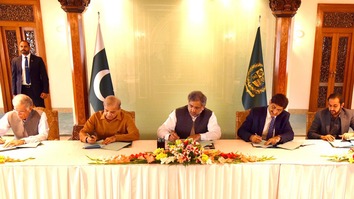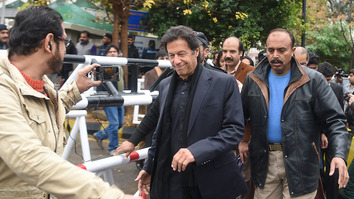PESHAWAR -- Despite reported irregularities in the July general elections, Pakistani opposition leaders are pinning great hopes on Prime Minister Imran Khan's new government to advance democratic ideals and process in the country.
"We have reservations over [the conduct of] the general election, but we still support the new government to strengthen the democratic process," Farhatullah Babar, a leader of the Pakistan Peoples Party (PPP), told Pakistan Forward. "It will lead to [national] development as well as the elimination of violence."
"It is a good development that voters have rejected parties with a record of terrorism in the election because they want peace," he said.
Public confidence in the democratic process has increased and voter turnout was higher than in the past two elections, said Abdur Rehman, a political scientist at Abdul Wali Khan University Mardan.
![A police officer checks the ID of a motorist entering Peshawar on September 10, two days before the start of Muharram. Opposition members are hopeful that democracy will help lead to the elimination of terrorism. [Javed Khan]](/cnmi_pf/images/2018/09/26/14647-23-585_329.jpg)
A police officer checks the ID of a motorist entering Peshawar on September 10, two days before the start of Muharram. Opposition members are hopeful that democracy will help lead to the elimination of terrorism. [Javed Khan]
"The entire nation stands behind the government to help achieve its goals, including development and peace," he told Pakistan Forward. "Unity will bear fruit."
"Khan's speech to the nation on August 19 inculcated a sense of confidence and self-respect among [Pakistanis], who are ready to accept the government's decisions with one voice," he said.
'Terrorism will die'
Khyber Pakhtunkhwa (KP) Governor Shah Farman, a Pakistan Tehreek-e-Insaf (PTI) leader, expressed hope in Pakistan's trajectory.
"All political parties ... are united against terrorism, which gives us hope that Pakistan [is on the way to becoming] a great country," he told Pakistan Forward.
Checks and balances define democracy, and those who fail to perform will face the voters' wrath in the next polls, Farman said. As a result, all elected officials will try to improve the condition of their constituents so that they can be re-elected.
Such efforts "will lead to political, social and economic improvement", he said.
The strengthening of democracy also means the demise of terrorism, said Khadim Hussain, a Peshawar-based security analyst.
"As soon as the democratic government gathers strength, terrorism will die," he told Pakistan Forward. "The perpetrators of violence don't like democracy and want to rule society through the use of force, which isn't acceptable to the population."
Most lawmakers understand the problems faced by their constituents, and they are expected to find solutions to the internal and external crises facing the country, Hussain said.
"Pakistan needs an objective foreign policy to accomplish its agenda of establishing good relations with the neighbouring countries as well as with the United States, which is our main partner in the war against terrorism," he said.
Progress and prosperity through democracy
Mian Iftikhar Hussain, secretary-general of the Awami National Party (ANP), said he wants Khan's government to tackle insurgency and pave the way for peace.
"Once we do away with violence, there will be progress," he told Pakistan Forward. "The prosperity of the [general public] should be the main objective of the government."
Most of the political parties promised to end violence, and now they will take their mission forward in the National Assembly, said Farhad Ali, a Pakistan Muslim League-Nawaz (PML-N) leader in KP.
"Pakistan has suffered immensely from the lack of peace over the past two decades, and it is the primary responsibility of elected representatives to work for peace," he told Pakistan Forward.
"Militants have been misusing the name of Islam to persuade Pakistanis to join their rank and file," he said. "We need to work in a democratic way so that Pakistani citizens can be assured that [democracy] is the best form of government."

![Pakistan opposition leader Maulana Fazl-ur-Rehman August 8 in Islamabad addresses protesters calling attention to alleged vote rigging in the July election. Opposition political parties have overcome their reservations to declare support for democracy in Pakistan. [Farooq Naeem/AFP]](/cnmi_pf/images/2018/09/26/14636-fazl-585_329.jpg)






